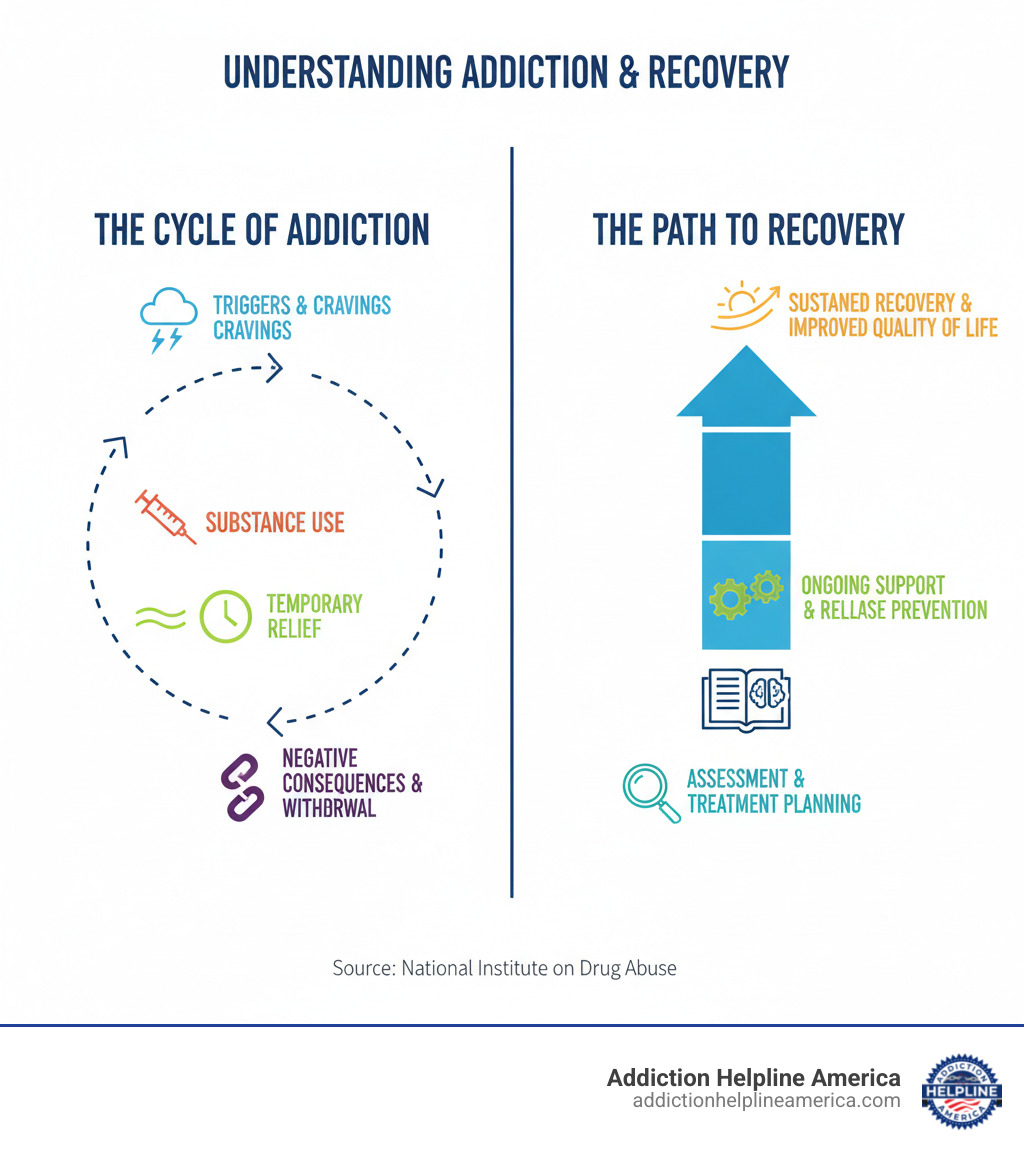
Why Counseling for Addiction Is the Foundation of Recovery
Counseling for addiction is a scientifically researched treatment that helps people with substance use disorders reclaim their lives. If you’re searching for addiction counseling, here’s what you need to know:
What It Is:
- Professional support from trained counselors specializing in addiction.
- Evidence-based therapy addressing substance use and its underlying causes.
- A safe, confidential space to explore your relationship with substances.
What It Does:
- Modifies harmful thoughts and behaviors related to substance use.
- Teaches coping skills for stress, triggers, and cravings.
- Addresses co-occurring mental health conditions like depression or anxiety.
- Builds a foundation for long-term recovery.
Where to Find It:
- Inpatient/residential treatment centers
- Outpatient counseling programs
- Online therapy/telehealth services
- Local county drug and alcohol offices
According to the National Institute on Drug Abuse, addiction is a treatable disorder. With proper counseling and support, people can manage addiction like other chronic conditions and regain control of their lives. The journey to recovery begins with the courageous step of asking for help. While feelings of shame or uncertainty are normal, addiction can affect anyone, and help is available, and recovery is possible.
At Addiction Helpline America, we connect individuals and families with compassionate, evidence-based counseling for addiction. We understand that finding the right support can feel overwhelming, and we’re here to guide you through the process.
Basic counseling for addiction terms:
Understanding the Need for Addiction Counseling
Addiction isn’t a matter of willpower; it’s a treatable medical condition that changes brain function. The National Institute on Drug Abuse (NIDA) defines addiction as a chronic disease that affects brain chemistry, behavior, and decision-making. A Substance Use Disorder (SUD) involves compulsive substance use despite serious harm, as addiction rewires the brain’s reward and motivation systems. This makes quitting without professional help extremely difficult.
The path to addiction involves a mix of genetic predisposition, environmental factors like early exposure or peer pressure, and trauma. With nearly one in seven Americans struggling with a substance use disorder in 2023, professional counseling for addiction is an essential part of addressing this health crisis.
The Signs and Symptoms of Addiction
Recognizing addiction can be difficult, but key patterns signal a problem. These include:
- Loss of control: Using more than intended or being unable to stop.
- Cravings: Intense, intrusive thoughts about using.
- Neglecting responsibilities: Prioritizing substance use over work, school, or family.
- Continued use despite consequences: Using even when it causes relationship, health, or legal issues.
- Increased tolerance: Needing more of the substance to achieve the same effect.
- Withdrawal symptoms: Experiencing physical or emotional distress when trying to quit.
These signs indicate significant changes in brain chemistry that professional counseling for addiction can help address. For more on alcohol-specific signs, see our guide on Signs of Alcohol Addiction.
Common Underlying Causes
Addiction often develops from a combination of risk factors. Effective counseling for addiction addresses these root causes, not just the substance use itself. Common underlying causes include:
- Family history: A genetic predisposition to addiction.
- Mental health issues: Using substances to self-medicate conditions like depression, anxiety, or PTSD, which creates a vicious cycle.
- Peer pressure and early exposure: Social influence, especially during adolescence, can increase addiction risk.
- Stress and trauma: Using substances as a coping mechanism for overwhelming emotions or traumatic experiences. This pattern can impact your entire wellbeing, as detailed in our article on the Impact on Life.
Counseling helps you understand why you started using and develop healthier ways to cope.
The Core of Counseling for Addiction: Goals and Methods
Counseling for addiction is a structured, evidence-based process for rebuilding your life. Its primary goals are to modify addictive attitudes and behaviors, develop healthy coping skills, and strengthen your motivation for recovery. This is achieved through a trusting partnership with a trained professional who understands the science of addiction. In this safe relationship, you’ll learn to manage stress, identify triggers, and build strategies for long-term sobriety, an approach backed by scientific research on addiction treatment.
What is Addiction Counseling and How Does it Work?
Addiction counseling is a specialized therapy focused on substance use disorders. Unlike general therapy, it concentrates on the brain and behavior changes of addiction. Your counselor is a trained professional who provides non-judgmental education and feedback about the disease of addiction and the recovery process.
The process begins by building a trusting relationship, allowing for an honest assessment of your unique situation. This collaboration leads to an individualized treatment plan, often guided by frameworks like the American Society of Addiction Medicine (ASAM) criteria, which evaluates six key dimensions of your life to ensure comprehensive care. A key benefit of counseling for addiction is learning to manage withdrawal and cravings. While medical detox may be needed for severe cases, counseling provides essential psychological support, teaching coping mechanisms and stress reduction techniques to steer early recovery.
Common Therapeutic Approaches
Counseling for addiction uses a variety of evidence-based methods custom to your needs. Common approaches include:
- Cognitive Behavioral Therapy (CBT): Helps you identify and change harmful thought patterns and behaviors related to substance use. You’ll learn to recognize triggers and develop practical coping skills.
- Dialectical Behavior Therapy (DBT): Focuses on mindfulness, distress tolerance, emotion regulation, and interpersonal effectiveness. It’s particularly useful for those with intense emotions or co-occurring mental health issues.
- Motivational Interviewing (MI): A client-centered approach that helps you resolve ambivalence about change and find your own motivation for sobriety.
- Eye Movement Desensitization and Reprocessing (EMDR): For those with past trauma, EMDR helps process traumatic memories to reduce their emotional impact, decreasing the urge to self-medicate.
- Family therapy: Involves family members to improve communication, set healthy boundaries, and create a supportive home environment for recovery.
- Holistic therapies: Address overall well-being through activities like yoga, meditation, and art therapy. These methods help with emotional expression and self-awareness. Learn more about Holistic Rehab.
Medication-Assisted Treatment (MAT) is often combined with counseling for opioid and alcohol addiction. For other substances, behavioral therapies are the primary treatment.
Addressing Co-Occurring Disorders (Dual Diagnosis)
It’s common for addiction and mental health conditions like anxiety, depression, or PTSD to occur together, a condition known as a dual diagnosis. These issues are often intertwined, with one worsening the other. For example, a person might use substances to cope with anxiety, only to find the substance use increases their anxiety over time.
Effective counseling for addiction requires an integrated treatment approach that addresses both the substance use and the mental health condition simultaneously. Treating only one issue increases the risk of relapse. This comprehensive approach treats the whole person, leading to better outcomes. For more on this topic, see the Information on Substance Use and Co-Occurring Mental Disorders and our resources on Mental Health.
The Recovery Journey: Treatment Settings and Long-Term Success
Recovery from addiction is not a one-time event but a new way of life that improves with practice. Counseling for addiction is vital throughout this journey, from early sobriety to long-term success. Building a strong support network and having a solid aftercare plan are essential for lasting recovery.
Different Settings for Counseling
Counseling for addiction is available in various settings to fit different needs:
- Inpatient or residential treatment: Live-in treatment at a facility for 30-90+ days, offering a substance-free environment with 24/7 support. Ideal for severe addiction or co-occurring conditions.
- Outpatient programs (OP): Allows you to live at home and attend scheduled counseling sessions, offering flexibility to maintain work, school, or family life.
- Intensive outpatient programs (IOP): More structured than standard outpatient, with more frequent and longer sessions each week while still living at home.
- Partial hospitalization programs (PHP): Offers comprehensive daily care similar to inpatient treatment, but you return home each evening.
- Online therapy and telehealth: Provides access to counseling for addiction from anywhere via video, phone, or messaging, removing barriers like location and stigma.
- Sober living homes: Transitional, substance-free housing that offers a structured and supportive environment with peers in recovery.
The Role of Relapse in Recovery
Relapse is a common part of recovery and does not signify failure. Relapse rates for addiction are similar to other chronic diseases like asthma. In counseling for addiction, a relapse is viewed as an opportunity to adjust the treatment plan. Counselors help you analyze what happened without judgment, focusing on identifying triggers, developing stronger coping strategies, and updating your relapse prevention plan. The key is to return to treatment quickly after a relapse to get back on track.
How Counseling Supports Long-Term Sobriety
Counseling for addiction helps you build a meaningful life in sobriety. Key areas of support include:
- Developing healthy habits: Establishing routines for sleep, nutrition, and exercise.
- Rebuilding relationships: Using therapy to repair trust, improve communication, and set healthy boundaries.
- Finding new purpose: Exploring hobbies, interests, or career paths that provide fulfillment.
- Ongoing support groups: Connecting with peers in groups like AA, NA, or SMART Recovery for community and accountability.
- Continued therapy: Checking in with a therapist regularly to steer life’s challenges and maintain long-term recovery.
Effective programs treat the whole person, addressing medical, mental health, and social factors. Learn more about these comprehensive approaches in our Drug Addiction Program resources. With the right support, you can build the life you deserve.
Finding the Right Fit: How to Choose a Counselor and Program
Deciding to seek counseling for addiction is a brave first step. The next, finding the right program, can feel overwhelming. Addiction Helpline America is here to guide you. Finding the right fit is about more than convenience; it’s about connecting with a skilled professional who makes you feel safe, supported, and hopeful.
Counselor Qualifications and Credentials
When choosing a counselor, credentials indicate specialized training and experience. Look for professionals with titles like:
- Licensed Professional Counselor (LPC)
- Licensed Clinical Social Worker (LCSW)
- Certified Addiction Counselor (CAC) or Licensed Addiction Counselor (LAC)
These titles represent advanced education, supervised experience, and state-level certification in counseling and addiction treatment. Most importantly, your counselor should have direct experience with addiction and a compassionate approach. We connect you with credentialed, experienced professionals committed to your recovery.
Involving Family and Friends
Addiction impacts the entire family, so involving loved ones in counseling for addiction can be transformative. Family counseling helps to:
- Improve communication and heal damaged relationships.
- Rebuild trust in a guided, safe environment.
- Teach family members how to set healthy boundaries and support recovery without enabling.
- Educate loved ones about addiction as a disease.
Support groups like Al-Anon and Nar-Anon also offer invaluable resources for family and friends, providing a community of people with shared experiences.
Ethical Considerations and Your Rights as a Client
As a client in counseling for addiction, you have rights that protect your dignity and empower your recovery. Key rights include:
- Confidentiality: Your privacy is protected by law (HIPAA). Your counselor cannot share your information without your written consent, except in cases of imminent harm or as required by law.
- Informed Consent: You have the right to a clear explanation of your treatment plan, including goals, methods, and potential risks, before you begin.
- Right to Refuse Treatment: You can decline any part of your treatment, stop at any time, or seek a second opinion without it affecting future care.
- Non-Judgmental Care: You deserve to be treated with respect and empathy, in an environment free from shame.
- Professional Boundaries: The therapeutic relationship must remain professional and focused solely on your well-being.
Addiction Helpline America connects you with providers who uphold these ethical standards, ensuring you are treated with the dignity you deserve.
Frequently Asked Questions about Counseling for Addiction
We understand that taking the first step toward counseling for addiction brings up a lot of questions. Let’s address some of the most common concerns.
How do I know if I need addiction counseling?
If you’re wondering whether you need help, it’s a sign worth exploring. Consider counseling for addiction if substance use is causing problems with your health, relationships, or work. Other indicators include:
- Trying to stop or cut back on your own without success.
- Experiencing intense cravings or increased tolerance.
- Neglecting responsibilities or continuing to use despite negative consequences.
- Having withdrawal symptoms when you try to stop.
If this sounds familiar, reaching out is a courageous step. Early intervention can lead to better outcomes, so you don’t have to wait for things to get worse.
What is the difference between addiction counseling and a 12-step program like AA?
These two resources are complementary, and many people use both.
- Addiction Counseling: This is professional therapy with a licensed counselor who uses evidence-based methods to address the root causes of your addiction, teach coping skills, and treat co-occurring mental health issues. It is confidential, individualized, and clinical.
- 12-Step Programs (e.g., AA, NA): These are free, peer-led support groups that offer community, shared experience, and a structured path to recovery. They provide accountability and fellowship rather than clinical treatment.
Essentially, counseling provides the clinical tools for recovery, while 12-step programs offer community support. Together, they form a powerful combination.
Can I be forced to go to counseling?
Generally, adults cannot be forced into counseling for addiction, as voluntary participation leads to better outcomes. However, there are exceptions:
- Court-Mandated Treatment: A judge can order treatment as part of a legal sentence or probation.
- Family Intervention: Loved ones can’t legally force you, but they can set boundaries and present treatment as a condition for continuing relationships.
- Emergency Situations: In rare cases where a person is an immediate danger to themselves or others, a temporary psychiatric hold may be used to initiate treatment.
While external pressure can be a catalyst, personal motivation is key to successful recovery. If you’re unsure, we can help you explore your options without pressure or judgment.
Conclusion: Your Path to Recovery Starts Today
As we’ve explored, counseling for addiction is a proven, compassionate approach to rebuilding your life. The most important takeaway is that addiction is a treatable disorder, not a character flaw. Like any chronic health condition, it responds to proper care and ongoing support.
Taking the first step by asking for help is often the hardest part, but it’s also the bravest. Concerns about whether treatment will work or if you can afford it are normal, but you deserve support.
At Addiction Helpline America, we make that first step easier. Our team offers free, confidential guidance to connect you with the right counseling for addiction program for your needs—from inpatient to online therapy. We connect you with trusted providers nationwide, understanding that every recovery journey is unique.
You don’t have to do this alone. Your path to a healthier, more fulfilling life can begin today.
Find confidential help on our Addiction and Rehab Hotlines
Recovery is possible. And it starts with reaching out.
Our helpline is 100%
free & confidential
If you or someone you care about is struggling with drug or alcohol addiction, we can help you explore your recovery options. Don’t face this challenge alone—seek support from us.
Programs
Resources
Will my insurance
cover addiction
treatment?
We're ready to help
Find the best
drug or alcohol treatment
center
Are you or a loved one struggling with addiction? Call today to speak to a treatment expert.
















